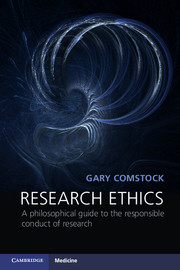Book contents
Conclusion
Published online by Cambridge University Press: 05 February 2013
Summary
Let us take stock. We’ve emphasized in this book the centrality of the research community and we have taken a philosophical approach to the traditional RCR topics. We’ve also stressed the idea that researchers, even as they watch out for hidden dangers, must persist in asking new questions. We have placed some red flags around areas where pitfalls lurk. And we’ve introduced the expanding moral circle as a heuristic device to guide our decisions when we are confronted with a difficult moral decision.
As the circle makes clear, we have not exhausted our responsibilities once we have followed our profession’s rules. For research exists to benefit all of society and a researcher’s obligations reach beyond his or her circle of friends, loved ones, and other researchers. We must respect the rights of strangers even though they are beyond the reach of our explicit contracts, take seriously the interests of all animals we conscript into our studies, and consider the interests as well of future generations. For their pains and sufferings will matter just as much to them as ours do to us. When deciding how to act, we respect human rights, but we also use our professional training to make the world as attractive and rewarding as possible for as many as possible.
The moral circle is grounded in four ethical theories. The theories are briefly summarized in Table 1.
Given that each theory has some weakness or other, how should we proceed in making decisions? The expanding circle heuristic does not invite us to choose theories randomly, as if we were selecting dessert from a menu. Instead, it requires that we take all of the considerations on the chart into account and seek the well-being of all individuals potentially affected by our actions. Table 1 reminds us that ethical decision-making may be difficult and that we must use our moral imaginations and challenge ourselves to ensure that we are thinking in a truly comprehensive way. Table 2 builds on Table 1 to suggest questions we should ask as we think critically about issues in practical ethics.
- Type
- Chapter
- Information
- Research EthicsA Philosophical Guide to the Responsible Conduct of Research, pp. 285 - 287Publisher: Cambridge University PressPrint publication year: 2013



